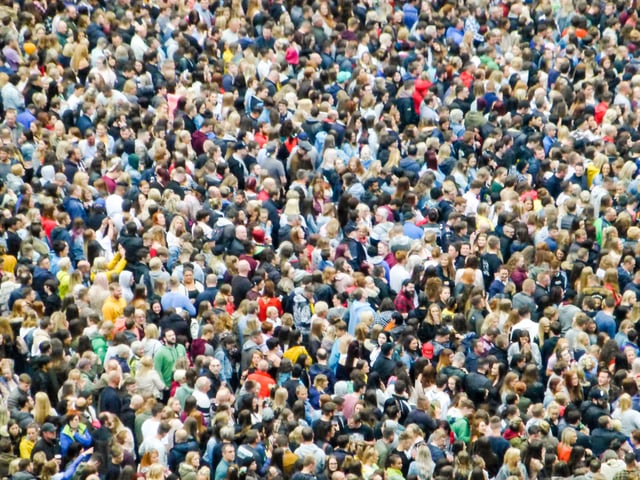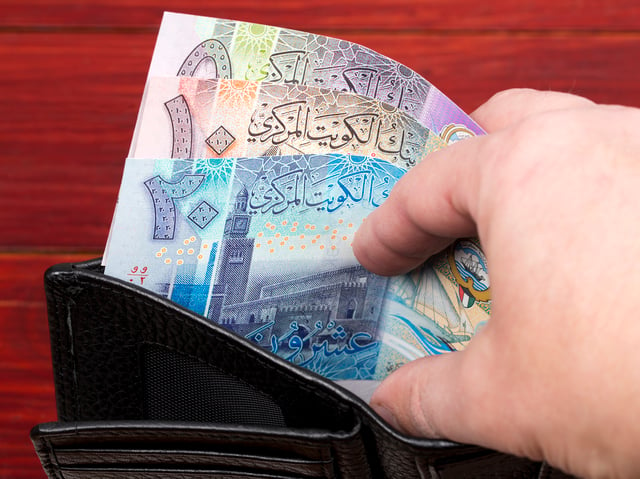There are 180 currencies in the world. The strongest one? (Drum roll please...)
The US Dollar? Nope. It's the...
We will get to this shortly!
First, let's look at how currency strength or value is calculated.
Let's also look at why it can have a major effect on your quality of life - including when you spend money on travel.
And we’ll explain why the world's most valuable currency is so valuable. (Hint - it’s a lot to do with the current situation the country is in).
How is currency strength/value calculated?
The value of a currency is affected by a number of key factors.

1. Economic stability
When economists rate a country's economic health. they consider things such as:
-
GDP growth
-
Unemployment/employment rates
-
Inflation
If a country has high GDP growth, low inflation, and low unemployment rates, it’s more likely to attract foreign investment.
These three things make it generally easier for investors to make money. And the more attractive a country is to investors, the more demand for the currency of that respective country. This in turn strengthens that currency.
2. Interest rates
The policy interest rate is a rate established by a country's central bank to influence the direction of key economic indicators (consumer prices, exchange rates, etc.).
The higher a country's interest rate, the higher the potential ROI an investor can expect by owning its currency. And the opposite is true for lower rates.
3. Political stability
Most of the time, the more politically stable a country is, the more stable its currency is. A stable political climate inspires confidence from potential investors.
Signs of political stability might include:
-
A political party that has been in charge for a long time
-
No political or civil unrest
-
Minimal geopolitical tensions or conflict
Foreign and trade relations
Relationships between countries can have a positive or negative effect on a currency.
For example, if two countries sign a new trade agreement, the value of one or both of their currencies is likely to enjoy a boost. Or when two countries become hostile to one another, it might impact the perceived prospects of one or both of the countries.
4. Population
Generally, it's a lot easier to run a country when there's less people in it.
This is one reason why countries with small populations can sometimes have such strong currencies, such as.
Take, for example, the following countries, their populations, and ranking on the global per capita GDP list:
-
Norway - 5.5 million (6th)
-
Denmark - 5.9 million (10th)
-
Kuwait - 4.2 million (34th)
-
Qatar - 2.6 million (4th)
-
New Zealand - 5.1 million (32nd)
-
Switzerland - 8.7 million (5th)

For comparison, the city of London, has a population approaching 10 million!
5. Market sentiment
Popular perception of a particular currency can affect its value.
If speculative investors view a particular currency favourably, it can increase in value. The inverse is also true.
For example, what Forex traders think matters. If a large number of them begin purchasing the dollar, the overall sentiment of that currency will be positive and the dollar will increase in value as a result.
What does a Forex trader do?
Forex traders buy and sell currencies for profit on the foreign exchange market. So, they can change the value of a currency simply by the volume of it they trade.
How does the value of currencies affect you?
You might not be running a country, but currency fluctuation does affect you in quite a few ways.
Travelling abroad
A strong domestic currency generally makes travel abroad more affordable.
This perk is amplified when you travel to countries with weaker currencies than your own.
For example, if you are from the UK, and you travel to Vietnam or Thailand, you will need to convert your Pound Sterling (GBP) to the Vietnamese Dong (VND) or Thai Baht, respectively.
In both cases, you’ll be at an advantage financially. This is partly due to the currencies you convert your funds into being weaker, and partly because of the relative cost of living in the country you are visiting.
Two examples are the Vietnamese Dong, the official currency of Vietnam or the Thai Baht, the official currency of Thailand.
For travellers coming in the opposite direction, there would be a negative difference in spending power. This is because their currency is weaker and the UK is comparatively expensive.
Purchasing power
The stronger a currency is, the cheaper it will be to import goods paid for using it are likely to become. And the weaker a currency is, the higher the cost of any imported products paid for in it will be.
In short, the cost of your weekly shop is likely to be affected in some part by currency fluctuations.
Inflation
Drastic currency devaluation can have a devastating effect on a population’s standard of living.
Take Venezuela’s economy. Their government printed a large amount of their currency (Venezuelan Bolivar).
But this devalued their currency significantly, leading to hyperinflation. The prices of goods and services skyrocketed to a peak of over 60.000% (that’s not a typo) in 2018, back down to a low of 359% in 2023.
Investments
Your nest egg can be cracked, or healed, by currency fluctuations.
For example, if you are British and the British pound becomes significantly weaker than the Euro, it will likely reduce the value of your investment portfolio.
Sending money abroad
Let's say that you send money to friends or family outside of the UK. Depending on the currency pair traded, you might be pleasantly or unpleasantly surprised - for example, when sending money from the UK to Thailand.
The strongest currency in the world: the Kuwaiti Dinar (KWD)
The Kuwaiti’s are currently winning (currency wise) for a few reasons.
Economic stability
Kuwait has 102 billion barrels of crude oil. This puts them at number 5 in the Middle East and number 7 in the world when it comes to oil reserves.
All this oil amounts to 50% of its total GDP. Because of the world’s reliance on crude oil, this is seen as a stable source of income. And stability is good for economic growth.
On top of the oil reserves, the government has also put in smart economic policies and doesn’t have much debt.
They also invest the proceeds from oil exports into a range of global assets. They do this through their own Sovereign Wealth Fund, the Kuwaiti Investment Authority (KIA).
The Kuwaiti Dinar is believed to be pegged to the value of a 8 - 10 currencies.
Political stability
Despite the fact that Kuwait sits in a fairly volatile part of the world, it’s a pretty stable place from a geopolitical standpoint.
There is little to no unrest in the country, and it has been run by the Al Sabah royal family for over a century.
Small population
Kuwait has a population of about 4.2 million, which, compared to its wealth, is tiny. This enables the government to distribute resources more effectively.
The per capita income in Kuwait is among the highest in the world, contributing to the strength of its currency.
This makes investors very confident that Kuwait is a good place to invest their money.
Limited printing of money
Unlike the Venezuelan government, the Kuwaiti administration doesn't need to overprint it's national currency.
Market sentiment
The Kuwaiti Dinar has a very positive market sentiment. Being number 1 means it is a great currency to have for investors and Forex traders alike.
The world's 10 strongest currencies
This list is taken from Forex.com.

1. Kuwaiti Dinar (KWD)
2. Bahraini Dinar (BHD)
The official currency of Bahrain is pegged to the US dollar. It also entered into a free trade agreement with the US in 2006. One of its main exports is crude oil.
3.Omani Rial (OMR)
The rial was first pegged to the US dollar in 1986.
Sharing the tip of the Arabian Peninsula with Yemen, the country has ample access to valuable natural resources.
4. Jordanian Dinar (JOD)
Despite struggling to grow its economy, Jordan's currency is still one of the strongest in the world.
This is largely down to Jordan pegging its currency to the US dollar, which gives it a lot of stability. It's seen as an outlier on this list.
5. British Pound Sterling (GBP)
The British Pound has a 5% share of reserve currencies globally.
It used to have the lofty position of being the world's reserve currency in the 19th and the early 20th century.
6. Gibraltar Pound (GIP)
Gibraltar is a city-state British Overseas Territory located at the southern tip of Spain.
The country covers just 2.6 square miles, but it was once a major port for ships passing between the Mediterranean Sea and Atlantic Ocean.
7. Cayman Islands Dollar (KYD)
The Caribbean British Overseas Territory provides offshore banking licenses for many companies.
The Cayman Islands dollar has been pegged to the US dollar since 1974.
8. Swiss Franc (CHF)
The official currency of Switzerland is widely recognised as the world's most stable currency. This is partly because of its wealth and geopolitical neutrality.
9. Euro (EU)
It's the world's second largest reserve currency, and the official currency of the European Union. The combined economic strength of the 27 countries in the EU gives the euro stability.
Out of those countries, the euro is the official currency for 20 of them, but they all accept euros for transactions.
10. United States Dollar (USD)
The US dollar is the world’s most traded currency. It also takes up the largest percentage of federal reserve currency globally.
Because of its global dominance, the dollar is used to price commodities such as oil and precious metals like gold and silver.
Pay less in fees when you travel with Currensea's travel debit card
While you may not wield political power of have billions in assets, there are things you can do to protect yourself from currency costs. Don't get caught out by high rates or fees when you're spending abroad. Travel smart and get your free travel debit card today.




